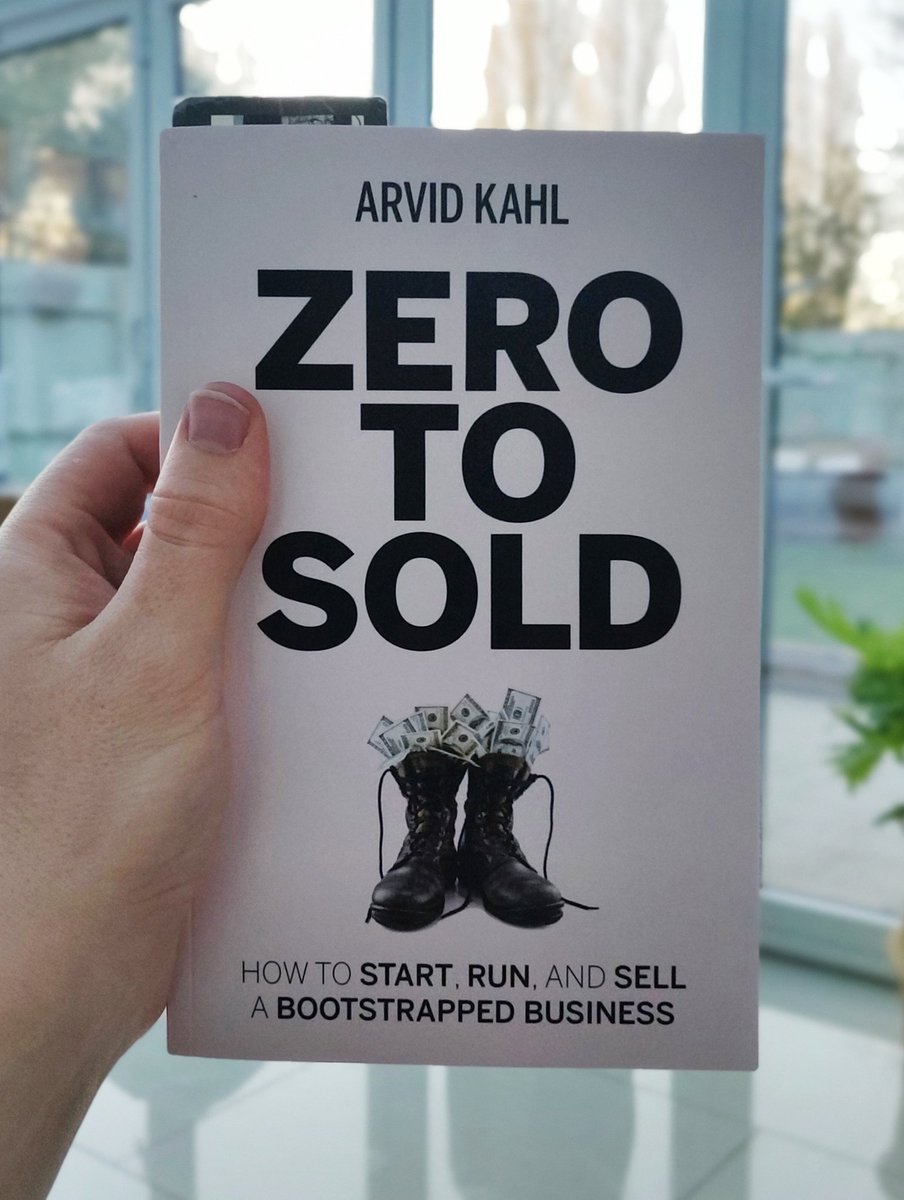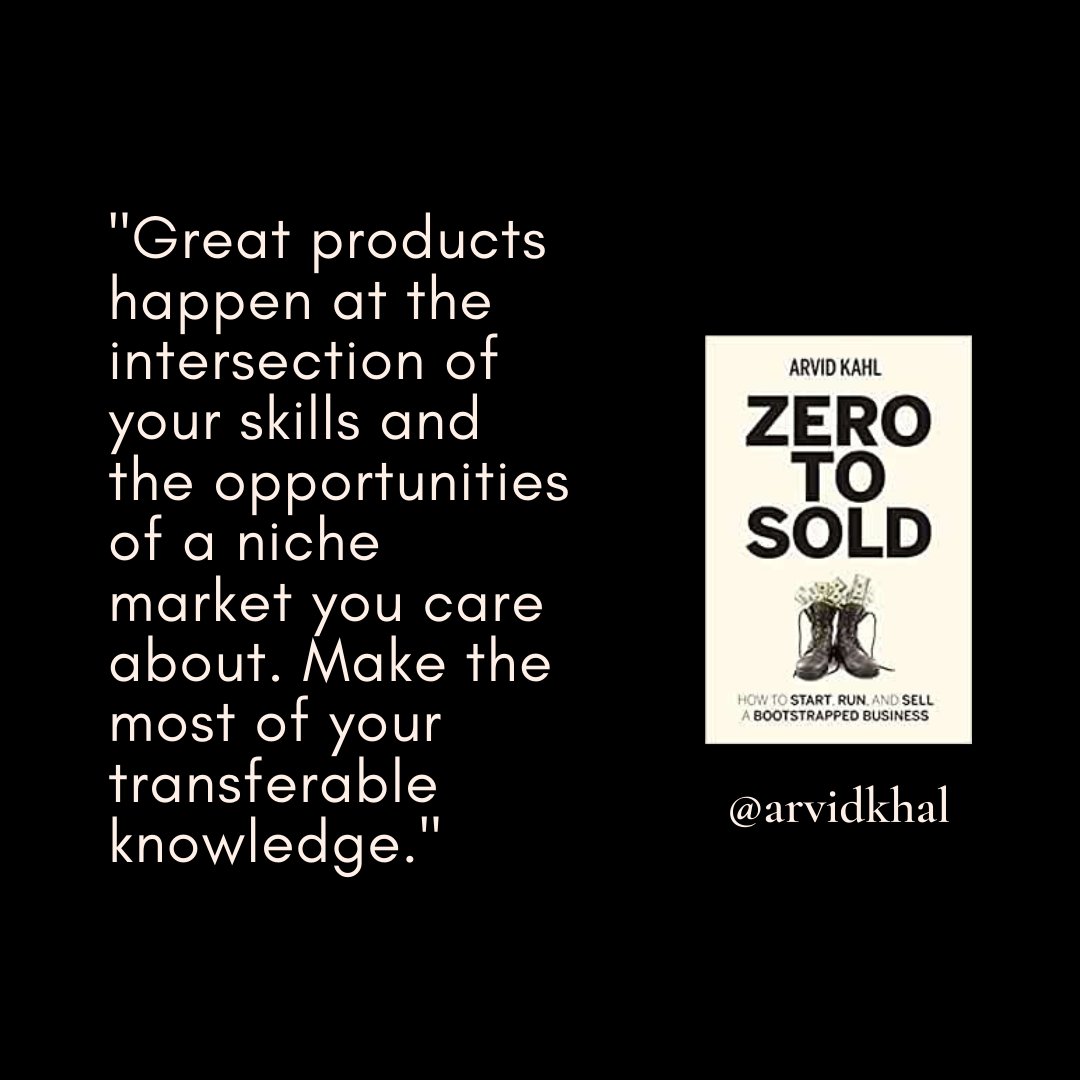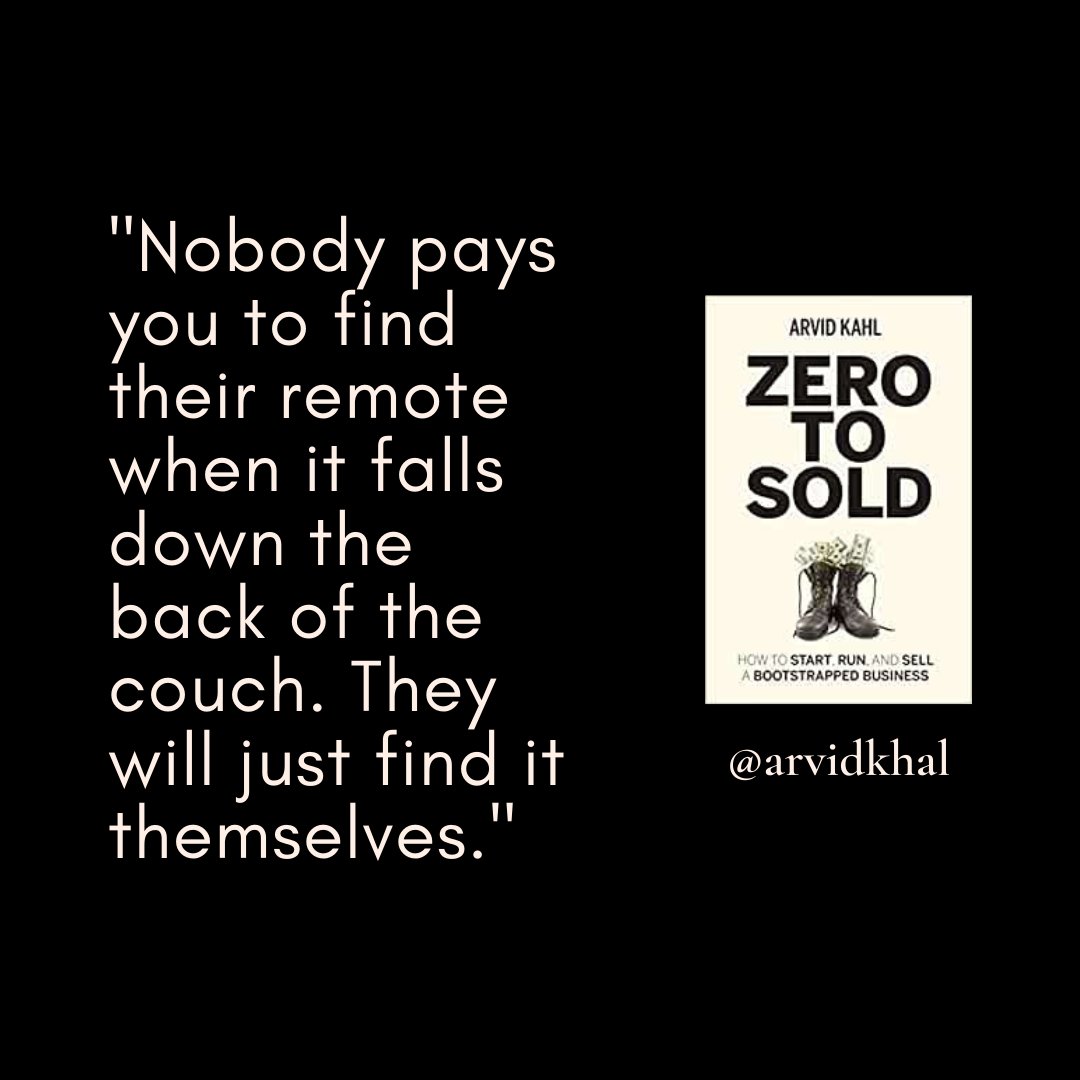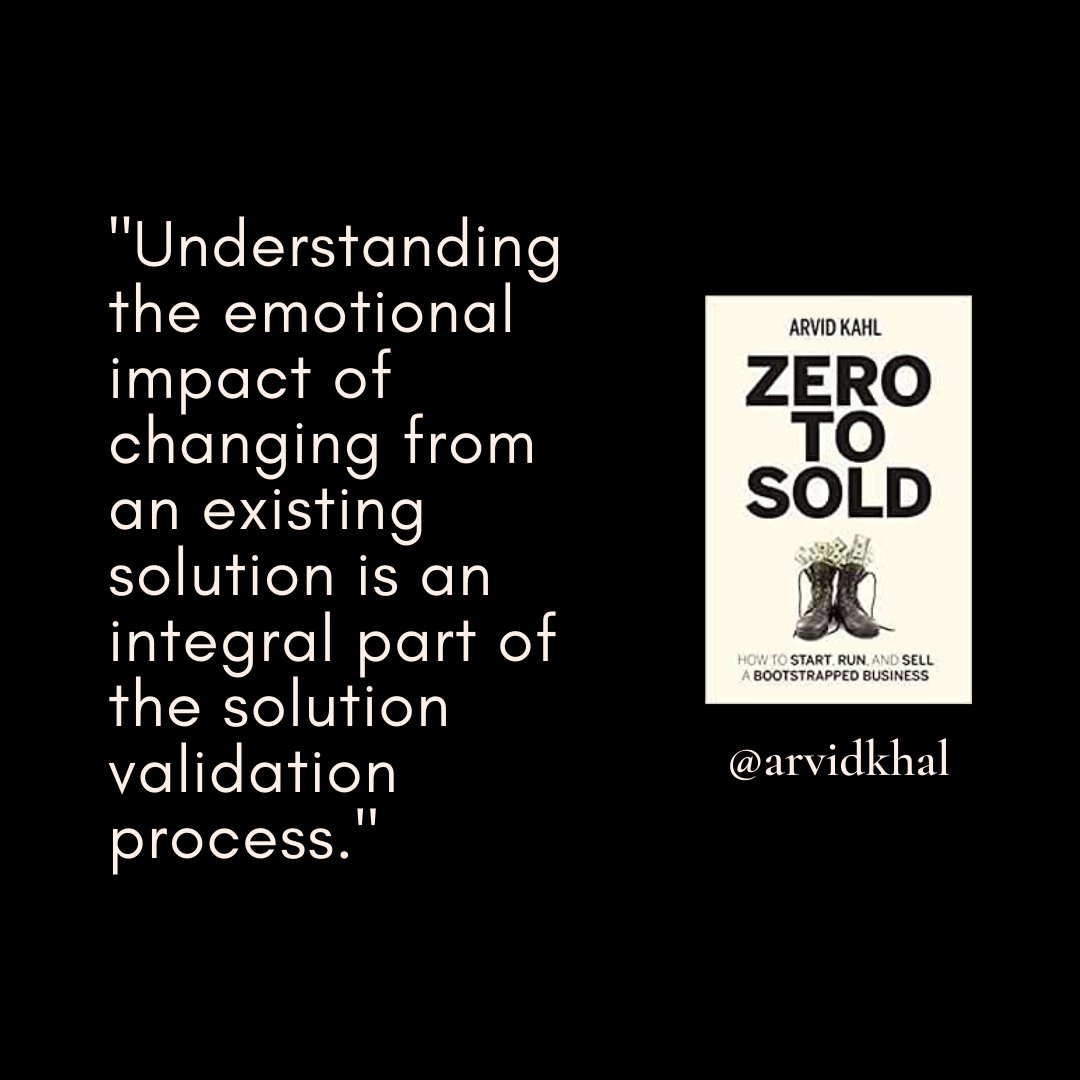
🚀 Bootstrapped startup lessons from "Zero to Sold" by @arvidkahl
I'll tweet my learnings 🤓 and actions 💪🏻 as I read Arvid's book.
A thread 🧵👇🏻
I'll tweet my learnings 🤓 and actions 💪🏻 as I read Arvid's book.
A thread 🧵👇🏻

I'm applying most of these learnings to my upcoming #EdTech startup.
First off, focussing on the market.
I have a fair understanding of the market as I know several small organisations quite well who would be the long-term target for the paid version of the SaaS.
First off, focussing on the market.
I have a fair understanding of the market as I know several small organisations quite well who would be the long-term target for the paid version of the SaaS.
In fact, I work *in* the industry in question.
I'm aiming to use this as my unfair advantage (as Arvid recently said to me!) 😎
But, ok. I may see a problem clearly because I work in the sector, but is it a 💥 CRITICAL 💥 problem?
I'm aiming to use this as my unfair advantage (as Arvid recently said to me!) 😎
But, ok. I may see a problem clearly because I work in the sector, but is it a 💥 CRITICAL 💥 problem?
Well, the pain point I want to help improve is something that learners in the UK *have* to do as part of their specific type of programme (yes I'm keeping it vague at the moment!)
💼 It's a legislative requirement.
✅ It has to be done.
💼 It's a legislative requirement.
✅ It has to be done.
So that's good for me, right?
Also, anecdotally and from personal experience I know it is often a struggle.
Something that tends to be left until the end (when that's definitely the worst way to do it).
It's painful and stressful and feels like a box ticking exercise.
Also, anecdotally and from personal experience I know it is often a struggle.
Something that tends to be left until the end (when that's definitely the worst way to do it).
It's painful and stressful and feels like a box ticking exercise.
What if I could gamify the process so learners actually *want* to do it.
Better yet, they'll be doing it without even realising they're doing it.
😎
But woah there Jon.
Who would be paying for this? How big is the market? And how can I validate the need beyond anecdotes?
Better yet, they'll be doing it without even realising they're doing it.
😎
But woah there Jon.
Who would be paying for this? How big is the market? And how can I validate the need beyond anecdotes?
👉🏻 ACTION #1
Figure out the market size 📊
The training organisations I would be targeting have to be on a government managed register.
It's public. 👍🏻
You can download a CSV of all the company names. 👌🏻
There are 2000+ of these organisations.
Nice 😎
Figure out the market size 📊
The training organisations I would be targeting have to be on a government managed register.
It's public. 👍🏻
You can download a CSV of all the company names. 👌🏻
There are 2000+ of these organisations.
Nice 😎
Some of those organisations will be too large for me: a small number of national leaders who will likely have their own tech.
The remainder, as long as they're active, should be prime targets. 🎯
The remainder, as long as they're active, should be prime targets. 🎯
👉🏻 ACTION #2 (Todo)
Reach out to more of these organisations and have a structured conversation with them about the identified problem.
In the process, new critical problems might be identified.
I can also start to ask how valuable a solution would be (i.e. price points)
Reach out to more of these organisations and have a structured conversation with them about the identified problem.
In the process, new critical problems might be identified.
I can also start to ask how valuable a solution would be (i.e. price points)
More learnings and actions to follow.
Here's Arvid's book on Amazon* in case you want to check it out.
Arvid told me Amazon was the best place to get a physical copy 👍🏻
* affiliate link
amazon.co.uk/Zero-Sold-Star…
Here's Arvid's book on Amazon* in case you want to check it out.
Arvid told me Amazon was the best place to get a physical copy 👍🏻
* affiliate link
amazon.co.uk/Zero-Sold-Star…
"Great products happen at the intersection of your skills and the opportunities of a niche market you care about. Make the most of your transferable knowledge."
- @arvidkahl
This is just razor sharp ⚡
- @arvidkahl
This is just razor sharp ⚡

On problem intensity 👇🏻
"Nobody pays you to find their remote when it falls down the back of the couch. They will just find it themselves."
Unless you're Apple and you just released AirTags 😝
"Nobody pays you to find their remote when it falls down the back of the couch. They will just find it themselves."
Unless you're Apple and you just released AirTags 😝

📝 Note to self
Questions to ask (B2BC) prospects: see pages 86-89 of the print book.
amazon.co.uk/Zero-Sold-Star…
Questions to ask (B2BC) prospects: see pages 86-89 of the print book.
amazon.co.uk/Zero-Sold-Star…
💡 A mini revelation:
The exploratory conversations that startup founders should have with prospective customers are a bit like the participatory research involved in Action Research.
This is my academic brain joining up dots with the practical startup world! 🤓
The exploratory conversations that startup founders should have with prospective customers are a bit like the participatory research involved in Action Research.
This is my academic brain joining up dots with the practical startup world! 🤓
⚡ Learning from "STEP THREE: YOUR SOLUTION"
Validate the solution(s) before building a product.
This happens by talking to prospects about your proposed solution and assessing the +/- impact and risks.
My take: iterate aggressively before you even touch any code.
Validate the solution(s) before building a product.
This happens by talking to prospects about your proposed solution and assessing the +/- impact and risks.
My take: iterate aggressively before you even touch any code.
"Understanding the emotional impact of changing from an existing solution is an integral part of the solution validation process."
✅ Engage your prospects
✅ Ask about their fears of change
✅ Ask about painful experiences with other solutions
✅ Avoid causing new problems!
✅ Engage your prospects
✅ Ask about their fears of change
✅ Ask about painful experiences with other solutions
✅ Avoid causing new problems!

Hope you're enjoying my tweets on "Zero to Sold" by @arvidkahl.
More to follow as I continue to glean actionable insights for my own EdTech venture 💪🏻
Have you already read it? Or reading it at the moment? Share your insights! 💡
And do 🔁 and ❤️ any tweets you enjoyed! 🙏🏻
More to follow as I continue to glean actionable insights for my own EdTech venture 💪🏻
Have you already read it? Or reading it at the moment? Share your insights! 💡
And do 🔁 and ❤️ any tweets you enjoyed! 🙏🏻
• • •
Missing some Tweet in this thread? You can try to
force a refresh


